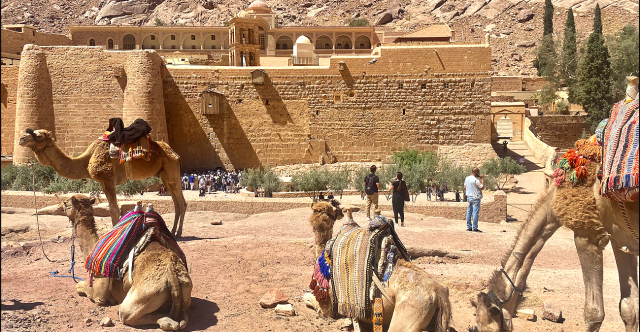The Greek delegation faces the challenging task of countering Egypt’s “Arab bazaar” approach regarding the Holy Monastery of Saint Catherine in Sinai. Led by Foreign Minister Giorgos Gerapetritis, the delegation is set to arrive in Egypt’s new capital this afternoon. The Egyptian side is attempting to frame the monks’ continued presence at the monastery—a site that has been operational for 1,500 years—as a significant concession by referring to them as “guests.”
A meeting is anticipated today in Cairo between Foreign Ministers Giorgos Gerapetritis and Sameh Shoukry, along with expert delegations from both nations. The Greek group, led by General Secretary of the Ministry of Education Giorgos Kalantzis, has previously participated in advisory roles during negotiations between the Monastery and the South Sinai Governorate related to a settlement finalized in December, which recognized the Monastery’s property rights. However, due to procedural delays on the Egyptian side, this settlement, although praised by both nations’ leaders during their May 7th meeting in Athens, was never ratified by Egypt.
It appears that Cairo was awaiting a court ruling to establish a “judicial fait accompli,” which could either lead to the confiscation of the Monastery’s distant properties or the revocation of its ownership rights over buildings and land both inside and outside its walls.
Statements from the Egyptian representatives indicate they plan to use the court ruling as the basis for their stance. It remains uncertain whether they will accept the previously negotiated settlement with some modifications or insist on starting new negotiations from scratch based on the court ruling and the withdrawal of the Monastery’s ownership rights.
The Greek delegation can only engage in these sensitive negotiations with one non-negotiable demand: the preservation of the Monastery’s operation and its religious and Orthodox character. This is directly linked to the property status affirmed in the previous settlement and recorded in the UNESCO documentation recognizing the Monastery as a World Heritage Site.
Athens must insist that, at a minimum, the buildings and premises within and around the Monastery walls be officially transferred to the Monastery’s legal ownership (which are currently registered under the acting Archbishop’s name), and that a compromise be reached regarding the surrounding land. Such an arrangement would involve the Monastery relinquishing its more remote properties—something the Egyptian government could present to its domestic audience as a concession to critics.
Today’s discussions must make it clear to the Egyptian government that productive relations with Greece depend on mutual respect—not coercion or unilateral decisions. Cairo may have underestimated Athens’ response to this maneuver or the mobilization within the Orthodox community, which will not limit itself to mere statements should these actions proceed. Egypt’s moves against the Monastery may reverberate in Brussels and Washington, where there is significant sensitivity to issues of Christian heritage in the Middle East.
For Athens, maintaining a strong relationship with Egypt and President Sisi is strategically crucial. Combined with Greece’s ties to Israel, this relationship is a key element in countering Turkish aggression. Clearly, this broader context is significant in today’s negotiations, as no party wants to jeopardize bilateral relations over an issue that can be settled through international standards and genuine goodwill.
Ultimately, the hope is that Cairo will recognize that this strategy—serving business interests, tourism developments, and catering to both nationalists and Islamist hardliners—risks dismantling a living Orthodox monument after 1,500 years. This would undermine Egypt’s standing as the largest Arab Muslim nation that honors religious diversity, multiculturalism, and tolerance.
Ask me anything
Explore related questions

















